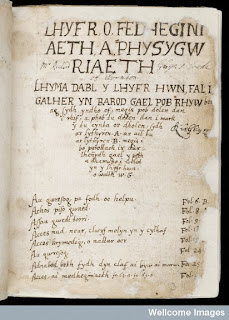 Of the thousands of manuscripts in the Wellcome Library, only one is written in Welsh. And as it's St David’s Day today – the patron saint of Wales, of course – we thought we would offer a few words on the manuscript.
Of the thousands of manuscripts in the Wellcome Library, only one is written in Welsh. And as it's St David’s Day today – the patron saint of Wales, of course – we thought we would offer a few words on the manuscript.Purchased for Henry Wellcome’s collection of manuscripts and books in 1907, and now catalogued as MS.417, Lhyfr o fedheginiaeth a physygwriaeth ('Book of remedies and medicine'), was written around 1600.
The language may be different, but the contents are similar to the Wellcome Library’s other medical manuscripts of the period. It is compiled from a host of sources, both local and classical in tradition. Treatments offered in the manuscript include cures for coughs, colic, ague and failing eyesight. Prescriptions include the use of herbs and ointments, but there are also directions for incantations and magical formulas. Indeed, MS.417 shares features with our collection of later 17th century – English - domestic remedy manuscripts.
The main difference between MS.417 and our domestic remedy manuscripts is that this is an item of a medical 'professional', hence the title of a 1924 published transcript of another version of this manuscript as A Welsh Leech-Book (‘Leech’ being an Old English word for Physician).
As indicated on our catalogue entry, authorship of the manuscript is disputed (it may have been the work of Sir Thomas Williams [1550?-1620?]). What MS.417 does offer up is some of its previous owners, the names of which are listed in 18th and 19th century hands. Given the bardic traditions of Wales, the name on this list of ‘Dewi Fardd’ – the poet and antiquary David Jones (1708?-1785) – is an intriguing presence.
The manuscript is deserving of more attention. A recent article in the journal Social History of Medicine argued that Wales in the Early Modern period, was part of a wider medical network than previous historians have accounted for. It would be interesting assess whether MS.417 helps to back up or dispute this claim.
